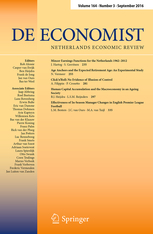
Legal Insider Trading and Stock Market Liquidity
This paper assesses the impact of legal trades by corporate insiders on the liquidity of the firm’s stock. For this purpose, we analyze two liquidity measures and one information asymmetry measure. The analysis allows us to study as well the effect of a change in insider trading regulation, namely the implementation of the Market Abuse Directive (European Union Directive 2003/6/EC) on the Dutch stock market. The first set of results shows that, in accordance with theories of asymmetric information, the intensity of legal insider trading in a given company is positively related to the bid-ask spread and to the information asymmetry measure. We also find that the Market Abuse Directive did not reduce significantly this effect. Secondly, analyzing liquidity and information asymmetry around the days of legal insider trading, we find that small and large capitalization stocks see their bid-ask spread and the permanent price impact increase when insiders trade. For mid-cap stocks, only the permanent price impact increases. Finally, we could not detect a significant improvement of these results following the change in regulation.





